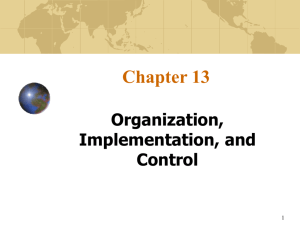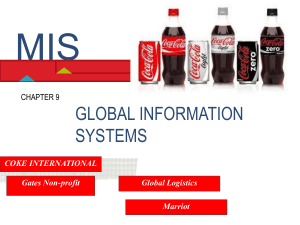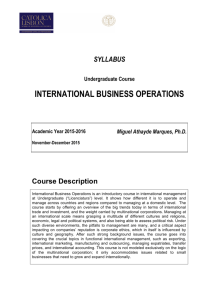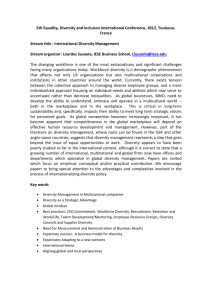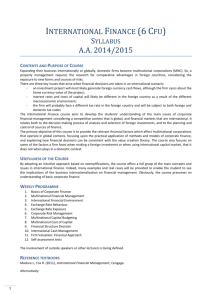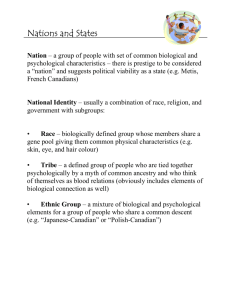Knowledge Transfer in Multinational Companies – Evidence from Hungary Katalin Dobrai
advertisement
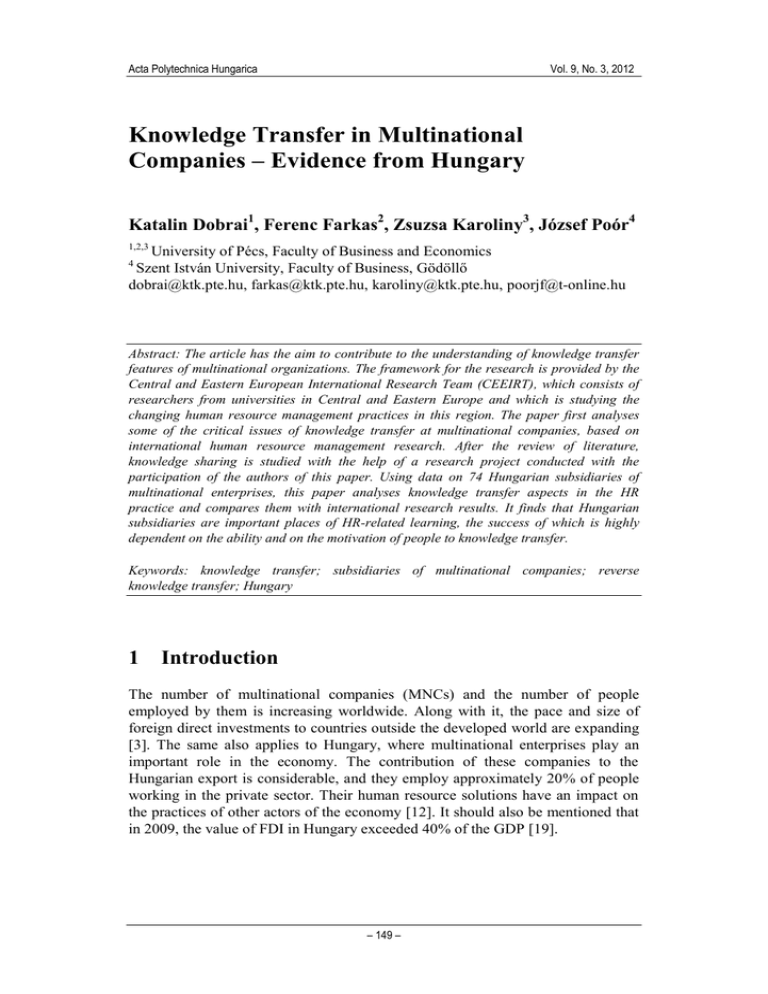
Acta Polytechnica Hungarica Vol. 9, No. 3, 2012 Knowledge Transfer in Multinational Companies – Evidence from Hungary Katalin Dobrai1, Ferenc Farkas2, Zsuzsa Karoliny3, József Poór4 1,2,3 University of Pécs, Faculty of Business and Economics Szent István University, Faculty of Business, Gödöllő dobrai@ktk.pte.hu, farkas@ktk.pte.hu, karoliny@ktk.pte.hu, poorjf@t-online.hu 4 Abstract: The article has the aim to contribute to the understanding of knowledge transfer features of multinational organizations. The framework for the research is provided by the Central and Eastern European International Research Team (CEEIRT), which consists of researchers from universities in Central and Eastern Europe and which is studying the changing human resource management practices in this region. The paper first analyses some of the critical issues of knowledge transfer at multinational companies, based on international human resource management research. After the review of literature, knowledge sharing is studied with the help of a research project conducted with the participation of the authors of this paper. Using data on 74 Hungarian subsidiaries of multinational enterprises, this paper analyses knowledge transfer aspects in the HR practice and compares them with international research results. It finds that Hungarian subsidiaries are important places of HR-related learning, the success of which is highly dependent on the ability and on the motivation of people to knowledge transfer. Keywords: knowledge transfer; subsidiaries of multinational companies; reverse knowledge transfer; Hungary 1 Introduction The number of multinational companies (MNCs) and the number of people employed by them is increasing worldwide. Along with it, the pace and size of foreign direct investments to countries outside the developed world are expanding [3]. The same also applies to Hungary, where multinational enterprises play an important role in the economy. The contribution of these companies to the Hungarian export is considerable, and they employ approximately 20% of people working in the private sector. Their human resource solutions have an impact on the practices of other actors of the economy [12]. It should also be mentioned that in 2009, the value of FDI in Hungary exceeded 40% of the GDP [19]. – 149 – K. Dobrai et al. Knowledge Transfer in Multinational Companies – Evidence from Hungary Multinational companies are an important playground for learning [21, 29] and for cross-border knowledge transfer [25]. They also play critical roles in knowledge sharing, since mergers and acquisitions provide excellent opportunities for both parent and subsidiary to renew their knowledge base and to add knew knowledge to it [17, 21, 27, 34]. Subsidiaries can play a strategic role both in the creation and diffusion of strategically important knowledge [30]. The present article also focuses on diverse aspects of knowledge transfer which were addressed above. The aim is to analyze the specific features of knowledge transfer in international companies, precisely in the field of human resources. This objective is justified by numerous research results [2, 8, 13, 16, 21, 25, 31, etc.] which emphasize the importance of the aspects of knowledge management and learning in the case of multinational organizations. Research on knowledge transfer in MNCs has shown enormous development over the last one and a half decades. Michailova and Mustaffa [22] identify four fields of research: the outcomes of knowledge flows, knowledge characteristics, actors involved in the knowledge flows, and the relationship between these actors. They also identify key accomplishments, existing gaps and future research directions. In spite of the remarkable improvement in this field, knowledge transfer issues in MNCs don’t get the attention they deserve, even though companies often fail due to lack of it. This paper joins the research described above, and also presents findings of research which was conducted within the framework of a long-term cooperation between researchers of Central and Eastern European universities (Central and Eastern European International Research Team: CEEIRT). The team examines the changing HR practices and functions which can be observed in the CEE region and in Hungary, and which take place in subsidiaries of multinational companies as result of social and economic changes [12]. Empirical data for this paper were gained from research carried out by the authors of the paper in Hungary. 2 Research Methodology The research included several topics of HR (key strategic issues, key HR issues, HR roles of headquarter and subsidiary, future and general HR issues). We also wanted to learn how the aspects of knowledge management are present in the field of HR, especially those of knowledge transfer. The findings are analyzed in this paper, which on one hand builds upon the results of international research and upon our own previous research in the field of HR [7, 14, 18]; and on the other hand, upon the research conducted internationally [21, 25, 31] and by our faculty in the area of knowledge management [10, 11, 15]. Within the framework of the project, HR functions and practical solutions were analyzed with the help of the tools of benchmarking. This study uses information – 150 – Acta Polytechnica Hungarica Vol. 9, No. 3, 2012 that was received from 74 Hungarian subsidiaries of multinational companies (personal interviews at 62 companies, an online questionnaire at 12 companies). About 80% of the interviewees were top managers or top HR managers, and the majority of them (60%) had spent at least 3 years in their current positions. Our statements are based on descriptive statistical data (frequency, distribution, average). 3 Knowledge Management in the Multinational Context The changing business environment has made organizational knowledge a critical factor of sustainable competitive advantage. Knowledge transfer plays a critical role in the long-term existence of the organization: it has strategic importance. When studying the knowledge management features of multinational companies we can turn to the model which was developed by Marquardt and Reynolds [21] about global learning organizations, and which shows very well how large is the variety of factors that have to be considered. They identify three levels of knowledge transfer, such as o individual and group level, o organization level and o global level, and each level expands the dimensions of the knowledge related characteristics of multinational enterprises. In the learning processes of organizations operating internationally , critical factors are location [31, 34], the distance [2] between the involved units, political issues, the organizational culture of the company [6, 34], characteristics of the strategy, structures and communication processes, language skills [33] or intercultural skills of the leaders. In the following section of the paper, the international dimensions of knowledge management will be analyzed. 3.1 Knowledge Transfer between Parent and Subsidiary Research usually shows a leading role of corporate headquarters in knowledge transfer of multinational companies, which means that a vertical knowledge transfer is characteristic of the companies: knowledge is transferred from the corporate centre to the subsidiaries. It is assumed that it is basically the subsidiary that learns from the parent; and there is no important knowledge flow in the other direction [34]. However, more and more research [1, 34] underpins a – 151 – K. Dobrai et al. Knowledge Transfer in Multinational Companies – Evidence from Hungary strengthening role of subsidiaries in organizational knowledge transfer. They contribute not only to the vertical but also to the horizontal knowledge transfer, if they own knowledge that is useful for both parent and other subsidiaries. 3.1.1 Organizational Strategy and Knowledge Transfer If we want to analyze the directions of knowledge transfer, we have to consider the strategies of multinational companies. Bartlett et al. [4] identify four kinds of strategic mentality. International strategic mentality is the earliest stage of internationalization, when technology and other kinds of knowledge, generally are transferred from the parent company to the subsidiary. Multinational strategic mentality shows that strategy is based “on the foundation of multiple, nationally responsive strategies of the company’s worldwide subsidiaries”. In companies with global strategic mentality, manufacturing, research and development are mainly managed from the headquarters; and also most strategic decisions are taken at the centre. Companies with transnational strategic mentality acknowledge the importance of flexible and responsive country-level operations. The methods of knowledge transfer which are identified by DeSouza and Evaristo [9] may be connected to the above-described strategies. According to them, there are three kinds of vertical knowledge transfer that embody three strategies of knowledge transfer in global enterprises: strategy commissioned in the headquarters of the company and which is carried out at the local subsidiaries; strategy developed in the headquarters and carried out regionally; strategy developed regionally and carried out locally. We can conclude that many researchers recognize the importance of the growing complexity of knowledge motion among company units. 3.1.2 Direction of Knowledge Transfer Yang et al. [34] emphasize that mergers and acquisitions provide good opportunities for the organizations to add to or renew their existing knowledge. Knowledge flows within multinational companies include, along with the traditional vertical knowledge transfer from the headquarters to the subsidiaries, also knowledge transfer in the opposite direction: knowledge flows from subsidiary to headquarters, the so-called reverse knowledge transfer. They show that the determinants of conventional and reverse knowledge transfer are based on different transfer logics. Conventional knowledge transfer is likely to be “transplantation” or “supplementation”, where the subsidiary generally adapts the knowledge coming from the parent company. Reverse transfer is more complicated than conventional knowledge transfer, so knowledge characteristics play a more important role than in conventional transfer. Subsidiaries may be motivated by the opportunity though, that they can strengthen their position through the transfer of knowledge within the whole organization, and that the parent company is interested in the knowledge transfer if it is beneficial for it from – 152 – Acta Polytechnica Hungarica Vol. 9, No. 3, 2012 some point of view. For this, the parent company may recognize and acknowledge new knowledge of the subsidiaries and its possible advantages. The distance of the knowledge flows also influences the methods chosen for knowledge transfer: namely the choice whether personal coordination mechanism or technology-based coordination mechanism is preferably applicable in knowledge transfer of a certain organization [2]. 3.2 Critical Players of Knowledge Transfer In the MNC context, cultural and functional similarity or diversity can have a very powerful impact on knowledge processes and knowledge sharing [20], and, since international business life is connected to people’s mobility and their interaction, with crossing national borders, factors such as understanding, tolerance, value system [6], impacts of multinational environment, languages, accent, behavioural diversity [5] have become more important than ever. Expatriates are seen as an important means of identifying new knowledge and transferring tacit knowledge in multinational corporations [30]. MNEs often assign expatriates to foreign subsidiaries with the aim of transferring knowledge; however, research is lacking in connection with their strategic role in facilitating knowledge transfer and in enhancing foreign direct investment performance [32]. We usually distinguish two kinds of assignments in multinational organizations: assignees sent from the parent company or from a third country to a subsidiary (expatriates) and the assignees from a subsidiary appointed for a long-term stay abroad at the parent company (inpatriates). Expatriates from the parent company play a significant role in interpreting and disseminating the parent company’s knowledge at the subsidiaries [30]. They usually transfer knowledge and skills which don’t exist at the subsidiary: organizational culture, technical knowledge, process knowledge, and financial and market knowledge. In addition to this, they take home new knowledge with them, because they work in a multicultural workforce, and they deal with different cultures, with different people and different attitudes. The expatriates benefit from the assignments, since their reputation and international competence improve as a result of their work abroad. As another outcome of their assignment abroad, a two-way knowledge transfer becomes reality. Organizations are interested in using the knowledge and experiences of the expatriates the best possible way, for the sake both of the organization and the individual. Thus, through their assignment, expatriates contribute to the reverse knowledge transfer of multinational organizations. However, in order to have a chance to do this, organizations have to develop knowledge-oriented views and also to develop and sustain a supportive collaborative organizational culture [5, 26]. The repatriation process affects the retention of these people, how their international experience and expertise is retained for the organization. – 153 – K. Dobrai et al. Knowledge Transfer in Multinational Companies – Evidence from Hungary When analyzing the role of expatriates, we must also talk about the fact that a critical though neglected factor in the knowledge transfer of multinational companies is the knowledge sharing ability of the sharing person. This is why we must in this process pay attention to the abilities and willingness of expatriates to transfer knowledge [23, 24, 28]. The disseminative capacity of the expatriate or knowledge sender depends on both the ability and willingness to share knowledge. Successful knowledge transfer is based on the individual’s intrinsic motivation [10, 28]. Multinational companies have different ways to develop the desired skills and competences of expatriates to transfer knowledge: long-term assignments abroad can strengthen the willingness of expatriates to transfer knowledge and, at the same time, their knowledge transfer skills can also improve through their involvement in diverse short-term projects or other unique solutions. However, not only characteristics of the knowledge sender but also characteristics of knowledge, and also of the receiver of knowledge, and the relationship between sender and receiver influence the degree of knowledge transfer from headquarters and subsidiaries [24]. Along with knowledge management initiatives coming from the centre, we should also mention the importance of expatriates from regional centres. This mobility gives the opportunity to adapt faster and more flexibly, instead of adapting centrally developed solutions. International project groups, committees, assignments [30] and informal networks can be viewed as efficient learning structures and framework in MNCs. The extent of the opportunity for members of the subsidiaries to participate in cross-border activities makes the possible contribution of them to international knowledge transfer transparent. The following section of the article analyzes the characteristics of this international knowledge transfer in Hungarian subsidiaries of MNCs, with focus on human resource management. 4 Knowledge Management and Human Resources Our statements regarding knowledge management features of practices in the field of HR are based on answers that we gained by using two different methods. First, there were questions explicitly addressing knowledge transfer features of the organizations under survey; second, there was information regarding other HR issues but which we also were able to explain from the perspective of knowledge management, since they may have implications for knowledge management. In focus was competence development and the factors that have an impact on it. We sought answers to questions such as: o Who plays a more important role in the organizational learning and in knowledge transfer: is it the headquarters, or is it the subsidiary? o In what direction does knowledge flow and what are its enablers? – 154 – Acta Polytechnica Hungarica o Vol. 9, No. 3, 2012 How does knowledge transfer take place within the international organization? First, we sum up our statements regarding the competences which are viewed as important. 4.1 Managing Competences 4.1.1 Important HR Functions and Desired Competences In the period examined, employee communication was first in the ranking of HR areas considered to be the most critical, most important HR functions. Respondents indicated that HR planning and talent management were similarly critical. This is reflected in the answers to the question regarding critical skills and competences. From a variety of the managerial competence fields of HR managers – such as personal credibility; change management; business knowledge; teamwork; strategic contribution; traditional HR services; knowledge of foreign languages; the use of information technology in HR and knowledge sharing competence – respondents found o the ability to ensure personal credibility (achieving results, effective relationships, communication skills) (84%); o change management capability and skills (68%), and also o appropriate business knowledge (66%) to be the three most important ones. 4.1.2 Competence Development We studied the most important personal competence development possibilities in the field of HR from three perspectives. We sought information a) regarding formal/informal learning, b) regarding the place where formal learning takes place (local vs. headquarter administered training and development), and c) the possibilities to learn as result of work-related mobility. We added to these dimensions also the dimension of intercultural trainings. What respondents held for the most powerful method of HR competence development and consequently, for the best learning opportunity, was local training end development, and informal learning on the job. They also found formal learning important. What we saw regarding informal learning corresponds to the well-known fact according to which people learn most and best during – 155 – K. Dobrai et al. Knowledge Transfer in Multinational Companies – Evidence from Hungary work, from their closest co-workers, by experience, or by doing activities. However, the priority of local learning as opposed to learning in the company centre may have different causes and requires further investigation. Learning in the centre received much lower scores, and so did mobility; these latter ones did not contribute to the competence development comparably to the methods described above. This regards the mobility between parent and subsidiary, and between subsidiaries. In the surveyed period of time, respondents held intercultural trainings for the least influential means of personal HR competence development. 4.2 4.2.1 Knowledge Flows Knowledge Sharing between Parent and Hungarian Subsidiary From the factors that facilitate knowledge transfer between parent and subsidiary (Table 1), the research project examined the motivation towards knowledge sharing, knowledge transfer abilities, and also the way of knowledge transfer and the kind of transferred knowledge. From these factors, respondents found the ability to transfer knowledge and motivation to transfer knowledge as most important factors and as the most important enablers of knowledge processes. Table 1 The enablers of knowledge transfer (on a 1 to 5 scale, average) (Source: empirical research of the authors) Respondents also meant that the knowledge transfer processes which are practiced in their own organization are the most important knowledge flow (Table 2). Knowledge flow from the parent to the subsidiary is the second most important flow of knowledge. It corresponds to the opinion of the respondents regarding the most important forum of knowledge transfer: the most important forum of knowledge acquisition is training and development at the local subsidiaries. The respondents found the importance of knowledge flows between subsidiaries much less important yet still considerable. This also corresponds to what they said – 156 – Acta Polytechnica Hungarica Vol. 9, No. 3, 2012 about the moderate importance of mobility between subsidiaries. Very few respondents found that the company centre shows any interest for HR experiences gained at subsidiaries and suggestions coming from there. This finding does not support the statements of research according to that reverse knowledge transfer [34] is getting more important in the knowledge transfer processes of multinational companies. Table 2 HR knowledge flows (on a 1 to 5 scale, average) (Source: empirical research of the authors) (Explanation 1 critical 5 not critical) Our findings correspond to international research results [32] which found that not only organizational structures and strategies influence the success of knowledge transfer, but also the characteristics of expatriates. If the knowledge of the parent firm is critical to the subsidiary’s development and if personal factors play a critical role in knowledge transfer, then it is very important for the headquarters to send expatriates who are motivated to transfer knowledge. The same can be stated about the ability of expatriates to transfer knowledge [22, 32]: Technological and management skills are necessary conditions for knowledge transfer, but not enough; an important condition for expatriate assignment is also that they need to be adaptable for knowledge transfer, to be able to transfer knowledge in a way that can be accepted and understood by the subsidiaries’ employees. 4.2.2 Knowledge Transfer from Outside the Organization External HR service providers also contribute to the learning processes in the organizations (e.g. consultants). As the data show (Table 3), external service providers were used most often in training and development. If we observe the key HR functions from the perspective of knowledge management we have to mention that in human resource planning and in performance assessment, almost none of the companies used the help of external service providers. – 157 – K. Dobrai et al. Knowledge Transfer in Multinational Companies – Evidence from Hungary Research results regarding direction and facilitators of knowledge transfer within multinational companies were underpinned by specific knowledge management solutions of the surveyed companies. Table 3 Role and use of external service providers in the different key functions of HR (Source: empirical research of the authors) Conclusions Based on both theoretical and our own empirical research, we can argue that an important strategic challenge for multinational enterprises is to develop an organizational framework that supports and improves their knowledge processes. From the specific aspects of the acquisition and the accessibility of knowledge as critical organizational resources, we can mention the distance between the organizational units, the diversity of national cultures and institutions, language diversity, changes in the number of expatriates, and the relevance of knowledge for the organization; all of these can highly influence both the importance and the success of knowledge processes. However, specific conditions such as the attitudes and motivation of the people concerned in the transfer of knowledge plays a role in successful fulfilment of goals. According to the findings of the survey conducted among Hungarian subsidiaries of multinational companies, the success of the knowledge transfer is dependent on the ability of the person to knowledge transfer and on the motivation to knowledge transfer, that is on his/her communication skills. – 158 – Acta Polytechnica Hungarica Vol. 9, No. 3, 2012 The results of the research also highlight that it is necessary to expand this research. There are several issues that remain unanswered at this moment and need further research. Acknowledgement The authors of the paper would like to thank the Hungarian Scientific Research Fund (OTKA #72388) for supporting this research. References [1] Adenfeldt, M. and Lagerström, K.: The Development and Sharing of Knowledge by Centres of Excellence and Transnational Teams: A Conceptual Framework. Management International Review, 2008, 48(3), pp. 319-338 [2] Ambos, T. C., Ambos, B.: The Impact of Distance on Knowledge Transfer Effectiveness in Multinational Corporations. Journal of International Management, 2009, 15: pp. 1-14 [3] Bartkus, V. O., Davis, J. H.: International Business Dynamics. Drivers of Multinational Corporations’ In-Country Economic Returns. Business and Society. 2010, 49 (2), 290-315 [4] Bartlett, C. A., Ghoshal, S. and Birkinshaw, J.: Transnational Management. McGraw Hill, Boston, 2004 [5] Bender, S. and Fish, A.: The Transfer of Knowledge and the Retention of Expertise: the Continuing Need for Global Assignments. Journal of Knowledge Management, 2000, 4(2), pp. 125-137 [6] Borgulya I. Vető Á.: A munkával kapcsolatos értékek Közép-Kelet Európában, nemzetközi felmérések tükrében. Vezetéstudomány, 2007, 38(78), pp. 51-66 [7] Brewster, C., Maryhofer, W. and Morley, M. (eds.): New Challenges for European Human Resource Management. Macmillan, London, 2004 [8] Cyr, D. J. and Schneider, S. C.: Implications for Learning: Human Resource Management in East-West Joint Ventures. Organization Studies, 1996, 17(2), pp. 207-226 [9] DeSouza, K. and Evaristo, R.: Global Knowledge Management Strategies. European Management Journal, 2003 21(1), pp. 62-67 [10] Dobrai K.: Tudástranszfer nemzetközi vállalatoknál. Vezetéstudomány, 2002, 33(5), pp. 22-29 [11] Dobrai, K. and Farkas, F.: Professional Service Organizations Meeting the Challenges of a Changing Business Environment. International Journal of Knowledge, Culture and Change Management, 2007, 7(3), pp. 73-84 – 159 – K. Dobrai et al. Knowledge Transfer in Multinational Companies – Evidence from Hungary [12] Dobrai, K., Farkas, F., Karoliny, Zs. and Poór, J.: Analyzing Knowledge Processes – Knowledge Transfer in Theory and Practice. In: Proceedings of MEB 2011, 9th International Conference on Management, Enterprise and Benchmarking Budapest, June 3-4, 2011, Óbuda University, 2011, pp. 185195 [13] Duan, Y., Nie, W., and Coakes, E.: Identifying Key Factors Affecting Transnational Knowledge Transfer. Information and Management, 2010, 47, pp. 356-363 [14] Farkas F., Poór J. and Karoliny Zs.: Human Resource Management in Hungary in Light of Eastern European and Global Comparison, PTE KTK, Pécs, Working Paper Series, 2007, 1(1), pp. 1-45 [15] Farkas, F.: The Role of Leadership in Knowledge Management and Knowledge Transfer. In: Lengyel, I. (ed.) Knowledge Transfer, Small and Medium-sized Enterprises, and Regional Developments in Hungary. JATE Press Szeged, 2003, pp. 1-14 [16] Fodor, P., Kiss, T., and Poór, J.: Focus on the Impact of the Economic and Financial Crisis on the Human Resource Function – Four Eastern European Countries in the Light of Empirical Research in 2009. Acta Polytechnica Hungarica, 2011, 8(1), pp. 81-104 [17] Johnston, S. and Paladino, A.: Knowledge Management and Involvement in Innovations in MNC Subsidaries. Management International Review, 2007, 47(2), pp. 281-302 [18] Karoliny, M-né., Farkas, F. and Poór, J.: Az emberierőforrás menedzsment magyar és közép-kelet európai sajátosságai a Cranet kutatás alapján. Vezetéstudomány, 2009. 40(7-8), pp. 3-11 [19] KSH (2010): Közvetlen külföldi tőkebefektetések. Statisztikai Tükör, IV. 16:2. és http://stats.unctad.org/FDI/TableViewer/tableView.aspx? ReportId=403 [20] Mäkelä, K., Andersson, U. and Seppälä, T.: Interpersonal Similarity and Knowledge Sharing within Multinational Organizations. International Business Review, 2011, doi: 10.1016/.ibusrev.20112.05.003, Article in Press, 2011, 13 pages [21] Marquardt, M. J. and Reynolds, A.: The Global Learning Organization. Richard D. Irwin, Inc. Burr Ridge, New York, 1994 [22] Michailova, S., Mustaffa, Z.: Subsidiary Knowledge Flows in Multinational Corporations: Research Accomplishments, Gaps, and Opportunities. Journal of World Business, doi: 10.1016/j.jwb.2011.05.006 2011, 14 pages [23] Minbaeva, D. and Michailova, S.: Knowledge Transfer and Expatriation Practices in MNCs: The Role of Disseminative Capacity. Employee Relations, 2004, 26(6), pp. 663-679 – 160 – Acta Polytechnica Hungarica Vol. 9, No. 3, 2012 [24] Minbaeva, D. B.: Knowledge Transfer in Multinational Corporations. Management International Review, 2007, 47(4), pp. 567-593 [25] Perez-Nordtvedt, L., Kedia, B. L., Datta, D. K. and Raheed, A. A.: Effectiveness an Efficiency of Cross-Border Knowledge Transfer: An Empirical Examination. Journal of Management Studies, 2008, 45(4), pp. 714-744 [26] Riege, A.: Actions to Overcome Knowledge Transfer Barriers in MNCs. Journal of knowledge management, 2007, 11(1), pp 48-67 [27] Saka-Helmout, A.: Unravelling Learning within Multinational Corporations. British Journal of Management, 2007,18, 294-310 [28] Teigland, R., Wasko, M.: Knowledge Transfer in MNCs: Examining How Intrinsic Motivations and Knowledge Sourcing Impact Individual Centrality and Performance. Journal of International management, 2009, 15: 15-31 [29] Tolbert, A. S., McLean, G. N. and Myers, R. C. (2002): Creating the Global Learning Organization (GLO). International Journal of Intercultural relations. 26: 463-472 [30] Tregaskis, O., Edwards, T., Edwards, P., Ferner, A. and Marginson, P. Transnational Learning Structures in Multinational Firms: Organizational Context and National Embeddedness. Human Relations, 2010, 63(4), pp. 471-499 [31] Van Wijk, R., Jansen, J. P. and Lyles, M. A. 2008: Inter- and IntraOrganizational Knowledge Transfer: A Meta-Analytic Review and Assessment of its Antecedents and Consequences. Journal of Management Studies, 45(4), pp. 830-853 [32] Wang, Sheng, Tong, Tony, W., Chen, Guoli, Kim, Hyondong, 2010. Expatriate Utilization and Foreign Direct Investment Performance: The Mediating Role of Knowledge Transfer. Journal of Management, 35 (5): 1181-1206 [33] Welch, D. E. and Welch, L. S.: The Importance of Language in International Knowledge Transfer. Management International Review, 2008, 48(3), pp. 319-338 [34] Yang, Q., Mudambi, R. and Meyer, K. E.: Conventional and Reverse Knowledge Flows in Multinational Corporations. Journal of Management, 2008, 34(5), pp. 882-902 – 161 –
